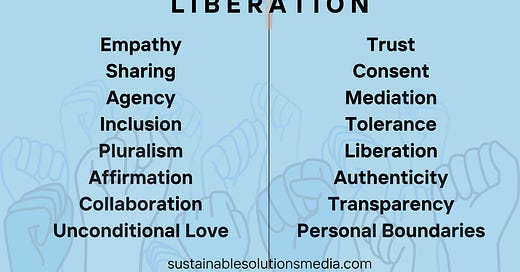Tools of Liberation in Relationships: Welcome to the Series
Tools of Liberation in Relationships
If the Tools of Oppression series was about naming the mechanisms that keep us small, quiet, disconnected, and complicit, Tools of Liberation is about what comes next: what happens after the naming and identifying, what becomes possible when we stop asking how to succeed in oppressive systems and start asking how to stop participating in them altogether.
Liberation is not a single act or destination. It’s a daily practice. It’s relational, intentional, and imperfect. We are not trying to escape all forms of structure, we are trying to build forms rooted in care rather than control. We are trying to create ways of living, loving, working, parenting, and belonging that allow us all to stay whole.
Where oppression isolates, liberation connects. Where oppression punishes, liberation repairs. Where oppression demands obedience, liberation invites participation. But liberation is not easy. It requires unlearning what we have been taught to think of as normal. It asks us to challenge deeply internalized beliefs about power, value, safety, success, love, and self-worth. Liberation means choosing curiosity over judgment, nuance over binary, and connection over coercion again and again.
This series shifts the focus from the macro to micro. While Tools of Oppression examined broader systems that shape our realities, Tools of Liberation will be rooted in personal relationships, the everyday spaces where transformation begins. Our most intimate patterns of trust, power, communication, and care are where the seeds of Power-With systems are planted. Macro relationships begin with micro ones. How we show up with our partners, children, communities, and ourselves is where liberation lives (or dies).
This series will explore the practices, perspectives, and frameworks that support Power-With, not Power-Over. We are not on a search for perfection. We are more focused on reorientation, helping us move through the world with more intention, capacity, and interdependence. The idea is to ask, in every context: Is this reinforcing oppression or opening space for liberation?
Whether you’re building relationships, raising children, organizing in community, or simply trying to live more fully in your truth, I hope this series helps you feel less alone, more resourced, and more connected to the world we are trying to create.
Welcome! Let’s begin again, this time with freedom in mind.
Check out the articles in the series by clicking any of the links below
Collaboration: Fostering Collective Efforts
Sharing: Distributing Resources Equitably





